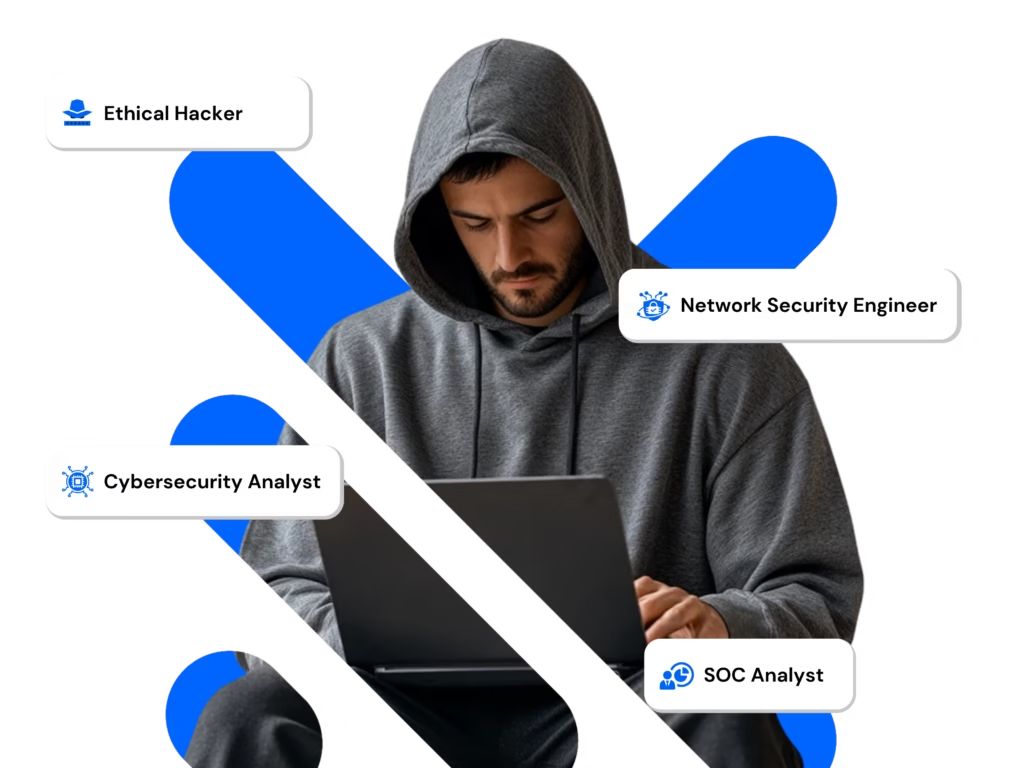
Incident Handling Certification, like the Certified Incident Handler (ECIH), equips professionals with the expertise to effectively manage and respond to cybersecurity incidents in an organization. This certification covers critical skills, including detecting, analyzing, containing, eradicating, and recovering from various security incidents like malware infections, data breaches, and network attacks. It’s designed for IT and cybersecurity professionals who aim to minimize the impact of cyber threats and ensure business continuity through effective incident response strategies.
The certification also emphasizes proactive planning and post-incident activities to strengthen an organization’s overall security posture, making it essential for roles in network security, SOC operations, and penetration testing.
Table of Contents
Importance of Incident Handling Certification
Enhanced Skills and Knowledge
Certifications in incident management provide comprehensive training that equips professionals with essential skills to effectively respond to and mitigate security incidents. Through hands-on learning and real-world scenarios, these programs enhance their ability to detect, analyze, and resolve incidents swiftly and efficiently.
By mastering best practices and methodologies, certified individuals can significantly improve an organization’s security posture, ensuring that they are prepared to handle potential threats and minimize damage during incidents.
Industry Recognition and Credibility
Holding a recognized certification significantly enhances a professional’s credibility among peers and employers. It serves as a clear indicator of expertise, showcasing a deep understanding of industry standards and best practices. This commitment to continuous learning and development signals to employers that the individual is serious about their career in incident management.
Additionally, certified professionals are often viewed as more reliable and competent, which can lead to greater trust from colleagues and stakeholders. As a result, certifications can open doors to new job opportunities and career advancement. Ultimately, they reinforce a professional’s dedication to excellence in their field.
Improved Incident Response
Certified individuals receive specialized training in best practices for incident detection, analysis, and resolution. This rigorous preparation equips them with the tools and techniques necessary to identify threats swiftly and accurately. As a result, they can assess situations more effectively, enabling timely and informed decision-making.
Their expertise leads to quicker responses to security incidents, minimizing potential damage. Additionally, trained professionals can implement proactive measures to prevent future occurrences. Ultimately, their ability to handle incidents efficiently strengthens an organization’s overall security posture.
Career Advancement Opportunities
Certification can significantly enhance job prospects for professionals in the field. It not only validates their skills and knowledge but also sets them apart in a competitive job market. Many employers prioritize certified candidates when hiring for critical roles, as these individuals demonstrate a commitment to excellence.
Additionally, certifications often correlate with higher-level positions, providing pathways to more advanced career opportunities. As professionals advance in their careers, they frequently enjoy increased salaries that reflect their enhanced expertise. Ultimately, certification is a valuable investment in both career growth and financial reward.
Risk Mitigation and Organizational Confidence:
Certified professionals play a vital role in helping organizations proactively identify potential threats before they escalate into serious incidents. Their expertise allows them to assess vulnerabilities and implement effective security measures, reducing the overall impact of any incidents that do occur. This proactive approach not only safeguards the organization’s assets but also enhances its reputation in the industry.
By demonstrating a strong security posture, certified individuals instill confidence in stakeholders, including clients, partners, and investors. Ultimately, their contributions are essential for maintaining trust and ensuring long-term organizational success.
Key Skills and Knowledge Required for Incident Handling

Technical Skills
Proficiency in various technical domains is essential for effective incident handling, including knowledge of networking, operating systems, and security protocols. Professionals must understand network architectures and configurations to identify vulnerabilities and potential entry points for attackers. Familiarity with security tools such as firewalls, intrusion detection systems, and antivirus software is crucial for monitoring and detecting threats.
Additionally, understanding incident response frameworks, like NIST or SANS, provides a structured approach to managing incidents. This expertise enables professionals to analyze incidents comprehensively and implement timely responses. Ultimately, these technical skills enhance an organization’s overall security posture.
Analytical Skills
Strong analytical skills are essential for assessing incidents quickly and accurately. Professionals must evaluate complex data sets to identify patterns and trends that indicate potential security breaches. This ability to discern the root causes of incidents is crucial for understanding the underlying issues and preventing future occurrences. Effective analysis enables informed decision-making, allowing teams to respond swiftly to threats.
Additionally, these skills facilitate the development of targeted mitigation strategies that address vulnerabilities. Ultimately, analytical proficiency enhances the overall effectiveness of an organization’s incident response efforts.
Communication Skills
Effective communication is vital for successful incident handling. Professionals must be able to convey technical information clearly to non-technical stakeholders, ensuring that everyone understands the situation. During incidents, collaboration with team members is crucial, as it allows for a coordinated response. Strong written and verbal communication skills facilitate timely updates and detailed reports, keeping all parties informed.
This clarity ensures that necessary actions are understood and executed without delay. Ultimately, effective communication strengthens the overall incident response process and fosters teamwork.
Top Incident Handling Certification Courses

Certifications Offered by SANS Institute
The SANS Institute offers a comprehensive range of certifications centered on incident handling, with the GIAC Certified Incident Handler GCIH certification being one of the most recognized. This certification focuses on essential skills for detecting, responding to, and mitigating security incidents effectively. It provides in-depth training on real-world scenarios, ensuring that professionals can apply their knowledge in practical situations. Participants learn to use various tools and techniques essential for incident management.
The GCIH curriculum covers topics like malware analysis, network security, and incident response strategies. By obtaining this certification, professionals significantly enhance their ability to protect organizations from security threats.
Incident Handler Certification from EC-Council
EC-Council’s Incident Handler Certification (E|CIH) emphasizes the crucial components of incident response and management. This certification equips professionals with the necessary knowledge and skills to handle incidents effectively and efficiently. Participants delve into key topics such as threat intelligence, which helps in understanding potential risks and vulnerabilities. The curriculum also covers incident detection techniques, enabling professionals to identify and respond to threats promptly.
Additionally, recovery strategies are explored, ensuring that organizations can restore operations quickly after an incident, ec council certified incident handler certification ultimately empowers professionals to enhance their organization’s security posture and resilience against cyber threats.
CompTIA Cybersecurity Analyst (CySA+)
The CompTIA Cybersecurity Analyst (CySA+) certification emphasizes critical skills in threat detection, analysis, and response. It prepares professionals to effectively identify and mitigate security incidents through a comprehensive understanding of behavioral analytics. This certification focuses on proactive measures that protect an organization’s systems and data from potential threats.
Participants learn to analyze data and security events, enabling them to respond quickly and efficiently to incidents. The curriculum also covers risk management and security controls, ensuring a well-rounded approach to cybersecurity. By earning CySA+, professionals enhance their capabilities to safeguard their organization against evolving cyber threats.
Ready to take your cybersecurity skills to the next level? Visit our Certified Incident Handler v2 (ECIH) Certification training page to learn more about the course structure, prerequisites, and enrollment options. Equip yourself with the expertise needed to protect organizations from cyber threats and become a certified incident handler today!
Tips for Choosing the Right Certification Course
Assessing Your Current Skills and Experience
Begin by evaluating your existing skills and experience in incident handling and cybersecurity. This self-assessment allows you to understand your strengths and identify any knowledge gaps that a certification could address. By pinpointing specific areas where you may need improvement, you can select a course that aligns with your current level of expertise.
This ensures that the training is appropriately challenging and relevant to your career aspirations. Additionally, understanding your skill set helps you set realistic goals for what you hope to achieve through certification. Ultimately, this process lays the groundwork for a more effective and rewarding learning experience.
Researching Course Providers and Reviews
Take the time to research various course providers and their certification offerings. Look for reputable organizations known for delivering quality training and strong outcomes. Assess their curriculum, delivery methods, and support resources to ensure they meet your learning preferences. Reading reviews and testimonials from past participants can provide valuable insights into the course content and teaching effectiveness.
This feedback can highlight strengths and weaknesses, helping you gauge the overall value of the training. By conducting thorough research, you’ll be better positioned to choose a provider that aligns with your goals and enhances your learning experience.
Considering Industry Relevance
Consider the relevance of the certification to your desired career path and the current job market. Research which certifications are recognized and valued by employers in your field, as this can significantly impact your job prospects. Focus on courses that address skills and knowledge areas that are in high demand, ensuring that you gain competencies that employers seek.
This alignment will help you stand out in a competitive job market. Additionally, understanding industry trends can inform your decision on which certifications will offer the best return on investment. Ultimately, choosing relevant certifications will enhance your employability and open doors for career advancement.
Explore More On:- 10 Crucial Ways to Guard Against Phishing Attacks
FAQs
Are incident handling certifications necessary for a career in cybersecurity?
Incident handling certifications aren’t always required, but they greatly boost career prospects in cybersecurity. They validate your skills in managing security incidents, making you a stronger candidate for roles in incident response and threat detection. For those aiming to specialize in these areas, certifications offer a competitive advantage and show dedication to the field.
How do I choose the right incident handling certification course for my career goals?
To choose the right incident handling certification, assess your skills and career goals. Research programs that align with your specialization, like threat intelligence or incident response. Consider the certification’s reputation, curriculum, and industry recognition. Also, factor in cost, time, and prerequisites to ensure it suits your career path and learning needs.
Can I pursue incident handling certification if I am new to cybersecurity?
Yes, beginners can pursue incident handling certifications. Entry-level options like CompTIA Security+ and CySA+ offer foundational cybersecurity knowledge, including incident handling, making them ideal for newcomers. These courses build essential skills and confidence, preparing you for more advanced certifications later on.
How do incident handling certifications benefit organizations in the face of increasing cyber threats?
Incident handling certifications benefit organizations by equipping staff with the skills to respond effectively to security incidents. Certified professionals can quickly identify, analyze, and mitigate threats, reducing the impact of cyber attacks. This helps improve security posture, minimize downtime, and protect the organization’s reputation as cyber threats grow more complex.





